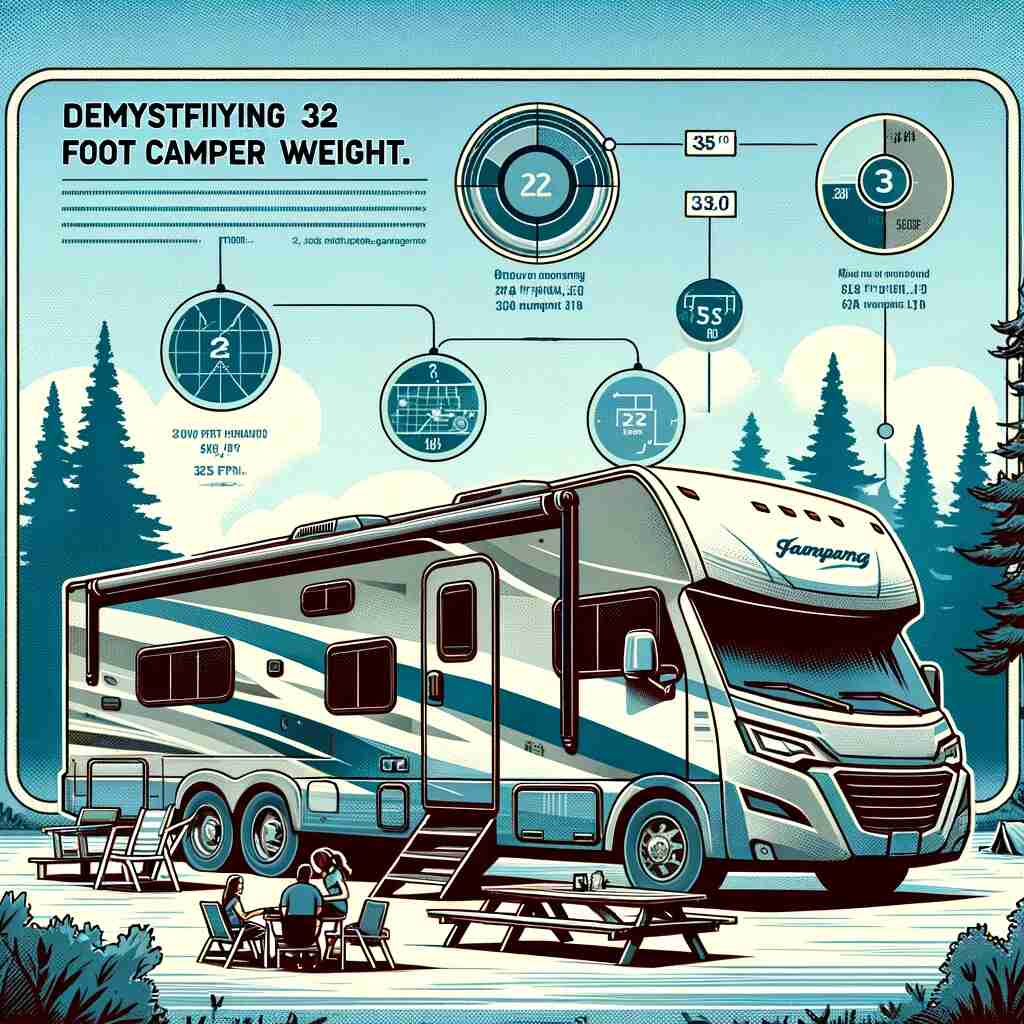If you’re in the market for a 32-foot camper or already own one, understanding its weight is essential for a safe and enjoyable RVing experience. Camper weight plays a crucial role in towing, stability, and overall travel comfort. In this comprehensive guide, we will explore everything you need to know about 32-foot camper weight, including how it impacts your travels, factors affecting it, and tips for making informed decisions.
32 Foot Camper Weight
When it comes to 32-foot campers, their weight can vary depending on several factors. Here’s a breakdown:
- Dry Weight: Typically ranges from 6,000 lbs to 8,000 lbs for standard models.
- Loaded Weight (GVWR): Generally falls between 8,000 lbs and 10,000 lbs, including cargo, water, and supplies.
- Average Weight: The average weight of a 32-foot camper hovers around 7,000 pounds to 10,000 pounds.
Please keep in mind that these figures are approximate and can vary based on the specific make and model of the camper. It’s essential to consult the manufacturer’s specifications for precise weight information.
Why Does Camper Weight Matter?
Understanding the weight of your 32-foot camper is crucial for several reasons:
- Towing Safety: Exceeding your towing vehicle’s capacity can lead to unsafe driving conditions. Knowing your camper’s weight ensures you select an appropriate tow vehicle and maintain safe towing practices.
- Stability: Proper weight distribution in your camper helps prevent swaying and ensures stable handling during travel.
- Fuel Efficiency: Overloading your camper can result in decreased fuel efficiency, affecting the overall cost of your trip.
- Legal Compliance: Many regions have laws and regulations governing the maximum weight that can be towed without special permits or licenses. Knowing your camper’s weight helps you stay compliant.
Factors Influencing 32-Foot Camper Weight
The weight of a 32-foot camper is influenced by several factors, including:
- Construction Materials: The choice of construction materials can significantly impact weight. Campers made from lightweight but durable materials may weigh less than those using heavier components.
- Amenities and Features: The inclusion of appliances, slide-outs, and additional features can add to the camper’s weight. Consider which amenities are essential for your travels.
- Cargo and Supplies: The weight of your camper will increase as you load it with supplies, water, propane, and personal belongings. Being mindful of your cargo’s weight is essential for safe travel.
- Manufacturer Specifications: Each camper model has specific weight ratings provided by the manufacturer. These specifications outline the dry weight, GVWR, and cargo carrying capacity (CCC), which are essential for weight management.
Tips for Safe Towing and Weight Management
To ensure a safe and enjoyable RVing experience with your 32-foot camper, consider these tips:
- Know Your Tow Vehicle’s Capacity: Match your camper’s weight with a tow vehicle capable of safely handling the load. Be aware of your vehicle’s towing capacity and tongue weight limits.
- Balance the Load: Distribute weight evenly inside the camper to maintain proper balance and prevent swaying during travel. Secure heavy items to prevent shifting.
- Calculate Tongue Weight: Aim for a tongue weight of around 10-15% of your camper’s total weight for improved stability.
- Use Weight Distribution Hitches: These hitches help distribute weight evenly between your tow vehicle and the camper, improving handling and control.
- Check Tire Pressure: Properly inflated tires contribute to better fuel efficiency and handling. Regularly inspect and maintain your camper’s tire pressure.
Real-World Examples of 32-Foot Camper Models
-
Jayco Jay Flight 32BHDS:
- Family-Oriented Design: The Jay Flight 32BHDS combines family-friendliness with a manageable weight. With a dry weight of approximately 7,400 lbs and a GVWR of around 10,000 lbs, it’s designed for families seeking a spacious and comfortable travel experience without the need for heavy-duty towing vehicles.
-
Airstream Flying Cloud 30FB Bunk:
- Timeless Elegance with Moderate Weight: The Airstream Flying Cloud 30FB Bunk is an icon of elegance that maintains a manageable weight. It boasts a dry weight of approximately 6,875 lbs, making it a stylish choice that doesn’t require an excessively powerful tow vehicle.
-
Forest River Rockwood Signature Ultra Lite 8329SB:
- Luxury Camping with Weight Considerations: The Rockwood Signature Ultra Lite 8329SB offers luxury without excessive weight. With a dry weight of approximately 8,900 lbs and a GVWR of around 11,400 lbs, it caters to those seeking comfort while keeping weight management in mind.
-
Keystone Cougar Half-Ton 32BHS:
- Adventure-Ready with Practical Weight: The Cougar Half-Ton 32BHS is built for adventure without compromising on weight. It typically has a dry weight of approximately 7,860 lbs, making it a versatile choice for outdoor enthusiasts.
-
Grand Design Imagine 3250BH:
- Versatile Layout and Weight: The Imagine 3250BH offers versatility along with weight considerations. It usually has a dry weight of approximately 8,940 lbs and a GVWR of around 11,995 lbs, providing a comfortable and adaptable camping experience.
These camper models not only stand out for their unique features but also for their weight, making them suitable for various towing setups and traveler preferences. Always refer to the manufacturer’s specifications for precise weight information and compatibility with your towing vehicle.
Conclusion
In conclusion, the average weight of a 32-foot camper generally ranges from 7,000 to 10,000 pounds. However, it’s essential to keep in mind that this is a broad estimate, and the actual weight can vary based on factors such as the camper’s make, model, construction materials, amenities, and optional features.
To obtain precise weight information for a specific 32-foot camper model, always refer to the manufacturer’s specifications, as they provide the most accurate and up-to-date data for informed decision-making.








